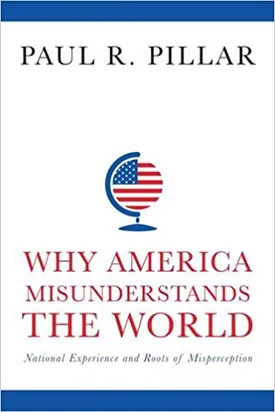Why America Misunderstands the World: National Experience and Roots of Misperception by Paul Pillar
In “Why America Misunderstands the World: National Experience and Roots of Misperception,” author Paul Pillar takes a comprehensive look at why America so often fails to adequately perceive international events and considers how this misperception of the world has lifelong consequences. From declining international standing to prolonged conflict, Pillar argues that American misunderstandings of global events and cultures have far-reaching and diverse implications.
Using both foreign and domestic policies, Pillar identifies the issues and explains why the US government has often misunderstood the world around it. He points to three main underlying issues which have caused persistent misunderstandings: the role of political culture; the extent to which the American people sympathize with or oppose foreign policy experiments; and the American people’s difficulty in understanding the complexities of foreign cultures. Pillar identifies a series of external challenges that have further exacerbated the problem, such as the changing dynamics of global power and the challenges posed by technological advances and international economies.
Using political culture as an explanatory framework, Pillar meticulously details the influence of rhetoric and imagery that has been established as a standard for US foreign policy for decades. He identifies a series of key characteristics of this political culture, such as an emphasis on military means over diplomatic relations and a knee-jerk distrust for entities which may differ from the typical US-defined “American values.” Through his examination of these defining features, Pillar details the extent to which much of the public discussion of US foreign policy ignores or downplays the broader implications of those policies.
Pillar then turns his attention to the domestic motivations and sympathies that have contributed to misperceptions of world events. He highlights the extent to which both elected officials and the public have engaged in binary understandings of the world, relying on either/or thinking which oversimplifies the complicated dilemmas of global politics. He traces the implications of such a flawed approach, arguing that misunderstandings occur because the public is not adequately exposed to the complexities of different cultures, values and ideas, leaving people underprepared to navigate the international arena.
The third section of the book focuses on the broader implications of foreign policy misperception. Pillar argues that the consequences of America’s failure to adequately understand world events goes beyond political failure, impacting the fundamental stability of the US economy, as well as the physical safety and healthy of its citizens. From political to economic instability, Pillar lays out the myriad of consequences that arise from a lack of knowledge and appreciation for global events.
Ultimately, Pillar takes a multifaceted approach to the problem at hand, providing tangible solutions for combating the problem. He emphasizes the importance of seeking out accurate information from a variety of sources and allowing the public to make more informed decisions with regards to US foreign policy. Through this, Pillar argues that much of the misperception can be traced back to a lack of education, suggesting the need to improve America’s educational system to ensure that its citizens are better equipped to understand the role of the US in world affairs.
In conclusion, “Why America Misunderstands the World: National Experience and Roots of Misperception” is an important work of thought-provoking analysis. Pillar provide clear and important solutions to help the US better understand, empathize and engage in global activities. Through a combination of psychological and political analysis, Pillar reveals the roots of misunderstanding and offers plausible solutions for a more accurate understanding of the international community.

